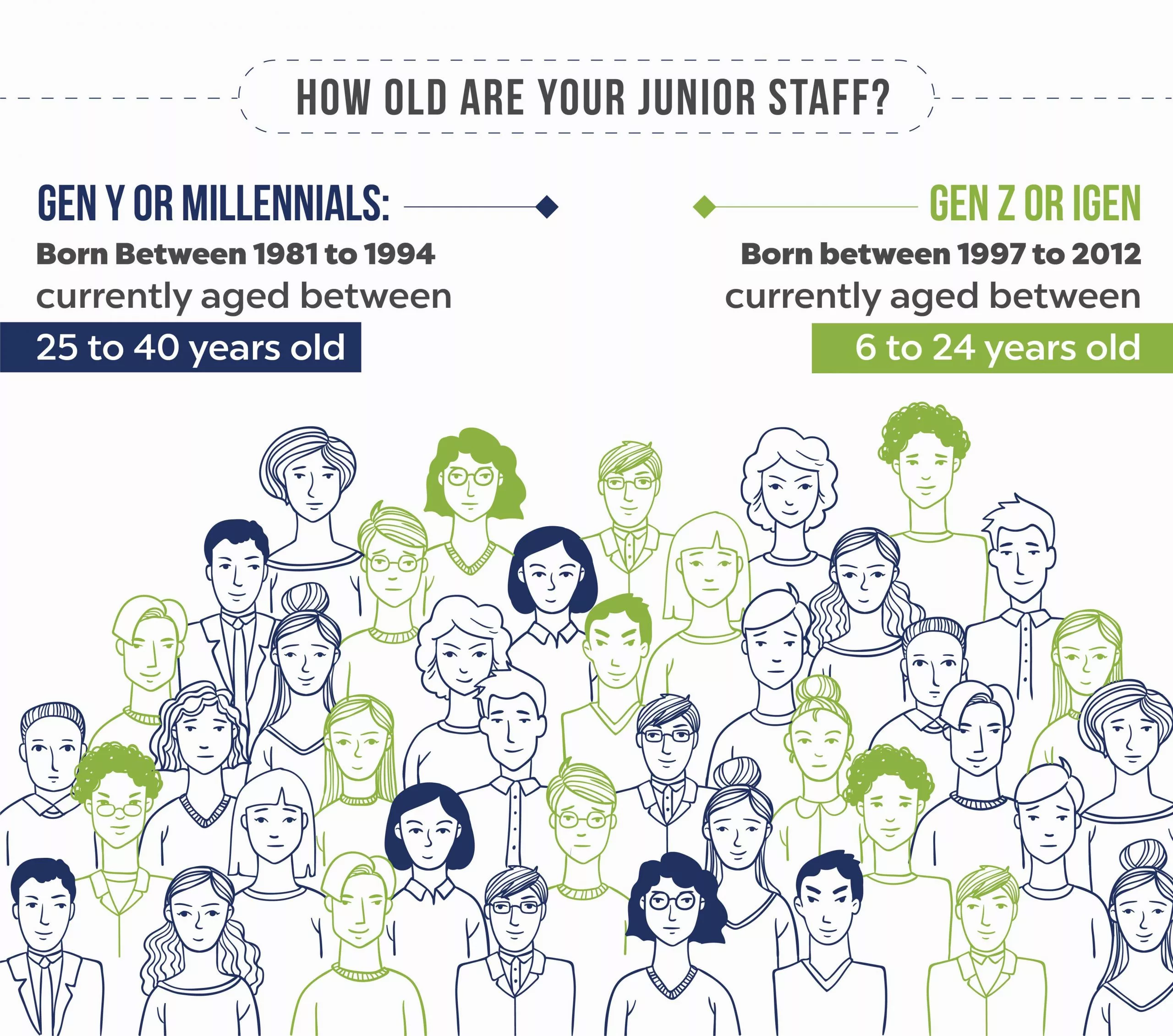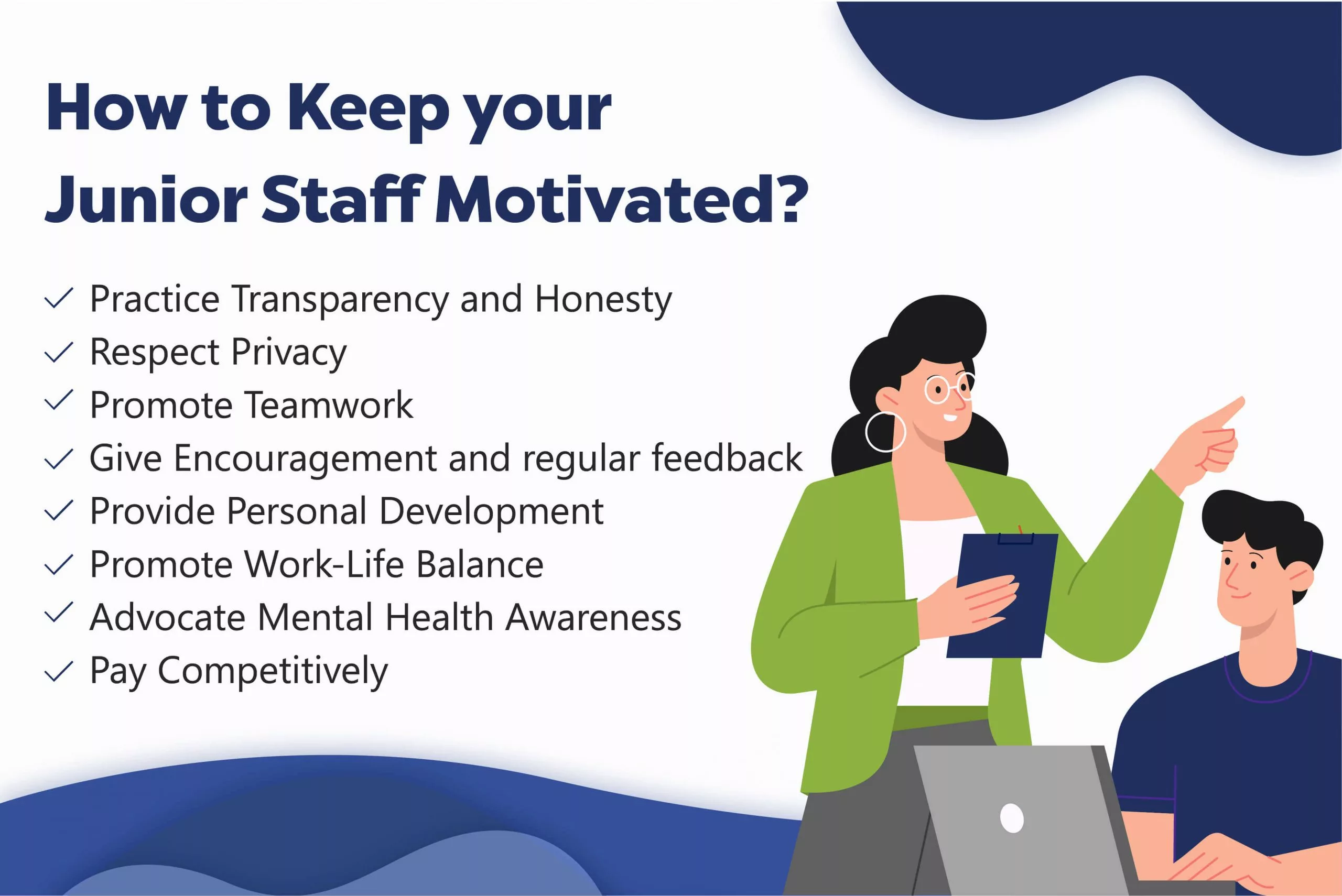Generation after generation replaces all workforce. The increase of Millennials and Generation Z staff means that multi-generations will be working together. Age diversity is somehow an issue in some workplaces. Managers and companies often do not know how to interact with junior staff and keep them healthy and engaged.
Table of Contents
ToggleHow old are your junior staff?

It is essential to know what generation your junior staff belongs to. Junior Staff are often categorized as millennials, a common mistake in labeling generations. As such, here are the following generation that your junior staff might belong to and its difference:
- Generation Y or more known as Millennials, are those born between 1981 to 1995. They are currently between 25 to 40 years old. This generation dominates the current workforce. According to PWC, millennials will make up 75% of the Australian workforce by 2025.
- Gen Z, also known as iGeneration, is the generation who are born between 1996 and 2012. They are currently between 9 and 25 years old. Despite being young, a few percentages of this generation are already part of the working population. According to the International Labour Organization, 21% of the world’s working-age population is between 15 and 24.
How to keep your junior staff motivated?
Keeping your staff motivated and healthy is the key to productive and efficient business operations. However, miscommunication often arises between older and younger staff, primarily if junior team members work remotely. Each generation has its accepted norms and values. The key to successful management staff is understanding and accepting these differences.

In case you do not know how to motivate junior staff, try these eight practical ways to encourage junior members:
-
Practice transparency and honesty
Simple transparency can boost mutual understanding and connection between older and younger staff. Millennials and Generation Z appreciate transparency at the workplace. Usually, these age groups would instead be involved than kept in the dark. Opening more to your employees makes them feel important and a part of the business.t encourages them to invest more into the business and be open for collaboration. Junior Staff always has a fresher and innovative way to improve your business.
Next read this: Three Ways To Ensure Your Remote Employees Don’t Feel Neglected
Aside from that, transparency opens an avenue for juniors to open any issue they are facing. When Juniors feel that the company offers open communication, it encourages them to bring problems forward instead of hiding or blaming others. Promoting communication can help older staff deal with difficult or unmotivated staff and solve any problem or blockers, maintaining a productive business operation.
-
Respect professional boundaries and privacy
Like your clients and customers, Junior Staff also treasures their information and personal lives. Anyone needs private spaces. Millennials like to put boundaries between their personal lives and work lives.
Not setting boundaries can cause issues at the workplace such as lack of respect with higher positions, senior and junior arguments, and juniors being taken advantage of by their seniors. Maintaining individual privacy and limitations in the workplace can help both the junior and the senior staff to avoid a potentially toxic work environment.
Avoid seeking and asking for personal information that they are not confident to share. Managers might need to set a few rules for the senior personnel as some might be assertive in creating relationships with the Juniors.
Getting to know each other can be harder for remote employees. Some might opt to follow others on their social media accounts to get to know each other more. Thus, it is vital to set boundaries, even for remote employees.
-
Promote teamwork and collaboration
Millennials and Gen Z appreciate a workplace that promotes collaborative work. They react positively with a healthy team environment and support. They like learning from their peers and are open to new suggestions. Junior employees, especially those working remotely, may often feel disconnected from their peers. It can be harder for them to connect or talk to their colleagues, especially older ones.
Also Read: Surefire Ways To Boost Employee Morale
Since the work style of the newest generation is team-oriented, fostering a sense of connection between younger staff and older staff is one great way to motivate employees and enhance collaboration, engagement, and relationships. Creating a friendly office environment may also suit the younger workforce. Hosting events, activities, or games allows staff to relax and have fun together. It is a great way to foster team unity and to enhance working relationships.
-
Give encouragement and regular feedback
Both the Millennials and Generation Z are motivated by growth, innovation, and quick progress. They adapt quickly and are very flexible as they yearn for success. With that, encouragements and reassurances are excellent for Juniors and the overall business.
Honest and constructive feedback can fuel their motivation and creativity to produce better results. Reward them for their excellent work. A simple “thank you,” “good job!” and “congratulations” can increase junior staff’s morale.
As such, it is essential to keep an open line of communication. In the case of Junior Remote Staff, communication is a door for reassurance and support. They often try to solve everything on their own that can eventually lead to failure or burnout. If you keep your door open for consultation, they finally ask for feedback on how they can improve their work and help the business.
-
Provide training and personal development
To some Junior Staff, having a clear and defined career path is one of the most critical aspects of their lives. The younger generations are more likely to stay in a company that helps them grow and provides more opportunities to support their career.
According to a study conducted by Gallup, How Millennials Want to Work and Live, 60% of millennials say that having the opportunity to learn and develop on the job is essential. Likewise, it is crucial to offer your junior staff a chance to attend training, conferences, and seminars that can help improve their skills and capability. Management can hold training and workshops inside the company and offer it to the whole company. You can also enhance Junior Staff’s skills by assigning them to lead a project and coaching them on the way.
-
Remember the Importance of work-life balance
Regardless of how much Junior Staff loves their workplace, work-life balance is still necessary. They need time to spend with their buddies and loved ones. It can help them recharge and is excellent in preventing burnout. Promoting work-life balance has become the most significant driver of employee retention among millennials.
This tech-savvy and digital generation can fundamentally work anywhere, even in the comforts of their home. Work-life balance is essential, especially with remote junior staff. For some Millennials and Gen Z, their home is their safe zone to rest and have fun. Some managers even think that working from home means availability 24/7. Junior Staff might find this invasive and detrimental to their personal lives.
Offering a paid time off might even boost performance. According to a 2012 study of generation by Griffith Insurance Education Foundation, millennials will likely sacrifice pay for additional vacation time. In addition, Dmytro Okunyev, founder of Chanty, says that “no matter how young or old, all employees are motivated by time off work.”
-
Offer competitive pay
While culture, training, and a healthy working environment drive millennials, compensation and bonuses are another way to motivate employees. Millennials are mainly motivated when they feel like the company recognizes their skills and worth. The best method to do that is by offering pay that is at par with the current market.
Properly compensating junior staff and all employees show that you value them as a great worker and human beings. Competitive pay would make your employees feel motivated to go to work and produce high-quality work. Staff who think they are compensated enough will likely stay in the company and prevent them from constantly recruiting and training new employees.
-
Advocate psychological safety and mental health awareness
Keeping and maintaining a healthy mind and soul is essential to anyone. Poor mental health and a toxic work environment can affect businesses and their employees’ job performance and productivity.
Millennials have higher rates of depression than other generations. According to the data report of Blue Cross Blue Shield Health Index, in 2017, people ages 21 to 26 had the highest rate of having health conditions, with major depression being prevalent.
Related reading: Surefire Ways To Boost Employee Morale
Employers can promote the importance of Mental Health Awareness and Stress Management in the workplace. As such, it’s vital to create programs, policies, and communication between employees. Aside from that, showing your junior staff that they matter would help them feel welcomed, especially those working remotely. They appreciate feeling heard and that they count. Creating a safe space will likely let junior staff own their mistake without the fear of admitting.
Steps to Motivate a Demotivated Employee
Despite your best efforts on keeping your employees happy, dealing with an unmotivated staff is sometimes necessary. It is common for employees to become demotivated from time to time due to some unforeseen work challenges or personal issues. As a senior showsor manager, it is essential to be aware of the signs of an unmotivated staff.
- Lack of punctuality
- Change of treatment towards peers
- Lack of focus
- Sudden low confidence
- Lack of inputs during meeting
If your staff shows some of these signs, managers might need to learn how to deal with an unmotivated workforce.
- Ask about the problem – Do not avoid confrontation or the issue. It is better to ask an employee if they are okay or if you can help with anything. Most junior staff will appreciate simple check-ins and being offered help in resolving any problems. Being asked will help them open up for honest discussion about their issue.
- Offer coaching or consultation – As a senior manager, you must care for and lead your team. Regular ‘catch-ups’ or coaching with a manager can help junior staff know the project and catch any blocker early, preventing further issues. Asking your juniors about their career aspirations can help the company and the younger team realign their goals.
- Help setting up clear goals – If the junior staff has a clear vision, it is easier to work without worrying about potential threats. According to a panel session conducted by INC, uncertainty and inconsistency affect productivity that leads to burnout. A clear set of goals can help employees measure their success and make them feel successful and valuable.
- Offer flexibility – Sometimes, employees face personal issues that can affect their work lives. As an employer, it is essential to be flexible to your employee’s needs and wellness. Providing time off or flexible work arrangements like working from home can help your employees deal with their problems.
What are the benefits of a motivated workforce?
Having a motivated workforce has various advantages, such as lower absenteeism, retention, and staff turnover. It can also enhance employee performance, quality, and customer service, preventing unmotivated staff effects. It also improves the relationship between managers, senior and junior level staff. Here are the other advantages of a motivated workforce:
- Lower levels of absenteeism – Employees often take day offs when unmotivated. Having a healthy work environment will encourage employees to work rather than staying off.
- Retention of workers – Having a motivated workforce can lower staff turnover. Lower retention is excellent for business continuity, as high staff turnover can hinder the successful delivery of services and products.
- Improved relationship between Senior and Junior Staff – Motivated employees are less likely to argue or have issues. Thus, they can focus more on their daily duties resulting in outstanding productivity levels.
In Summary
Bear in mind that you need to be flexible and creative for your team as you work to find the best way to motivate your junior staff. Like every company, employees are also different. Some may be flexible to work with your old management, and some may not.
Perfect your motivation strategy by collaborating with both your junior and senior staff. Always remember that employees are worthy investments and can help your company in the long run. In Flexisource IT, we believe that every employee is a valuable partner. Check out our Engagement and Retention Expertise to know more.





